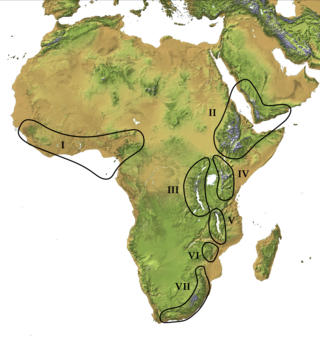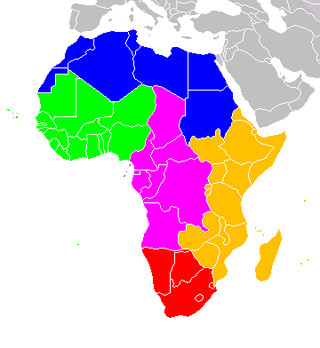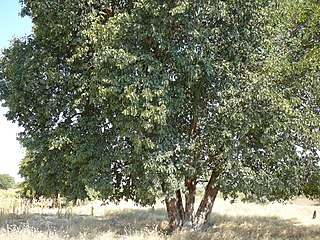Related Research Articles
The Global 200 is the list of ecoregions identified by the World Wide Fund for Nature (WWF), the global conservation organization, as priorities for conservation. According to WWF, an ecoregion is defined as a "relatively large unit of land or water containing a characteristic set of natural communities that share a large majority of their species dynamics, and environmental conditions". For example, based on their levels of endemism, Madagascar gets multiple listings, ancient Lake Baikal gets one, and the North American Great Lakes get none.

In the United States government, the Bureau of African Affairs (AF) is part of the U.S. Department of State and is charged with advising the Secretary of State on matters of Sub-Saharan Africa. The bureau was established in 1958. It is headed by the Assistant Secretary of State for African Affairs who reports to the Under Secretary of State for Political Affairs. Molly Phee is the current Assistant Secretary.

The individual member states of the African Union (AU) coordinate foreign policy through this agency, in addition to conducting their own international relations on a state-by-state basis. The AU represents the interests of African peoples at large in intergovernmental organizations (IGO's); for instance, it is a permanent observer at the United Nations' General Assembly.

The Afromontane regions are subregions of the Afrotropical realm, one of the Earth's eight biogeographic realms, covering the plant and animal species found in the mountains of Africa and the southern Arabian Peninsula. The Afromontane regions of Africa are discontinuous, separated from each other by lower-lying areas, and are sometimes referred to as the Afromontane archipelago, as their distribution is analogous to a series of sky islands.

The following is an alphabetical list of subregions in the United Nations geoscheme for Africa, used by the United Nations and maintained by the UNSD department for statistical purposes.

The African Union covers almost the entirety of continental Africa and several off-shore islands. Consequently, it is wildly diverse, including the world's largest hot desert, huge jungles and savannas, and the world's longest river.
The seventh All-Africa Games were held in September 1999 in Johannesburg, South Africa. As the track is at an altitude of 1748 metres all performances are considered to be set at altitude, this is believed to assist events up to 400 metres and in the long jump and triple jump. However, for events beyond 800 metres the thinner air is believed to have a detrimental effect on performances.

Baikiaea is a genus of flowering plants in the legume family, Fabaceae. It includes six species of trees native to sub-Saharan Africa. Species range from Nigeria eastwards to Uganda and Tanzania and south to Zimbabwe, Botswana, and Namibia. Habitats range from lowland tropical rain forest to seasonally dry forest and woodland or savannas on well-drained soils.

Orthetrum brachiale, the tough skimmer or strong skimmer, is a species of dragonfly in the family Libellulidae. It is found in Angola, Benin, Botswana, Burkina Faso, Cameroon, Central African Republic, Chad, Comoros, the Republic of the Congo, the Democratic Republic of the Congo, Ivory Coast, Egypt, Equatorial Guinea, Ethiopia, Gabon, Gambia, Ghana, Guinea, Kenya, Liberia, Madagascar, Malawi, Mali, Mauritania, Mauritius, Mozambique, Namibia, Niger, Nigeria, Réunion, Seychelles, Sierra Leone, Somalia, South Africa, Sudan, Tanzania, Togo, Uganda, Zambia, Zimbabwe, possibly Burundi, and possibly São Tomé and Príncipe. Its natural habitats are subtropical or tropical moist lowland forests, dry savanna, moist savanna, subtropical or tropical dry shrubland, subtropical or tropical moist shrubland, shrub-dominated wetlands, swamps, intermittent freshwater lakes, freshwater marshes, and intermittent freshwater marshes.

Tourism is an important economic sector for many countries in Africa. There are many countries that benefit heavily from tourism like Uganda, Algeria, Egypt, South Africa, Kenya, Morocco, Tunisia, Ghana and Tanzania. The touristic particularity of Africa lies in the wide variety of points of interest, diversity and multitudes of landscapes as well as the rich cultural heritage. Also, an ecotourist industry is present in some African countries.
Craterispermum is a genus of flowering plants in the family Rubiaceae. It contains 16 species that occur in tropical Africa and Seychelles. It is the only genus in the tribe Craterispermeae, of which the divergence time is estimated at 34.8 million years ago.

Athletics at the 2019 African Games was held from 26 to 30 August 2019 in Rabat, Morocco.
The Zambezian region is a large biogeographical region in Africa. The Zambezian region includes woodlands, savannas, grasslands, and thickets, extending from east to west in a broad belt across the continent. The Zambezian region lies south of the rainforests of the Guineo-Congolian region. The Zambezian region is bounded by deserts and xeric shrublands on the southwest, the Highveld grasslands of South Africa to the south, and the subtropical Maputaland forests on the southeast.

The African Judo Union (AJU) is the governing body of judo in Africa. It is one of the five continental confederations making up the International Judo Federation (IJF). AJU was formed on 28 November 1961 in Dakar (Senegal). AJU has headquarters in Madagascar and consists of 54 member federations.
The Botswana national football team represents Botswana in international football under the control of the Botswana Football Association. Following the independence of Botswana in 1966, the football federation was founded in 1970. It later joined the Confederation of African Football (CAF) in 1976 and FIFA in 1982.
References
- Thieme, Michelle L. (2005). Freshwater Ecoregions of Africa and Madagascar: A Conservation Assessment. Island Press, Washington DC.